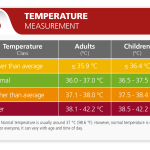As humans, our bodies are incredibly complex machines that function within a delicate balance of temperatures to keep us alive and thriving. But have you ever stopped to think about what the average body temperature range is? You might be surprised to learn that it’s not just a number – it’s a vital sign that can reveal a lot about our overall health.
What is Average Body Temperature Range?
In this blog post, we’ll delve into the fascinating world of thermoregulation and explore what constitutes a normal body temperature. Whether you’re a fitness enthusiast, a medical professional, or simply someone who’s curious about the human body, this article will help you understand the importance of body temperature and how it affects our daily lives.
The Importance of Body Temperature
So why is body temperature so crucial? For starters, it plays a critical role in regulating our metabolic processes. When our body temperature rises or falls outside of its normal range, it can have significant consequences for our overall health and well-being. For instance, fever – which occurs when the body’s temperature rises above 98.6°F (37°C) – is often a sign of infection, while hypothermia – which sets in when the body’s temperature drops below 95°F (35°C) – can be life-threatening if left untreated.
As we explored earlier, body temperature plays a vital role in regulating our metabolic processes. But what exactly is the average body temperature range, and how does it impact our overall health?
The Average Body Temperature Range
The normal body temperature range for adults is between 97.7°F (36.5°C) and 99.5°F (37.4°C). However, this range can vary slightly depending on factors such as age, sex, and environmental conditions.
Factors Affecting Body Temperature
Did you know that certain medications, such as antihistamines and beta-blockers, can cause body temperature fluctuations? Additionally, changes in altitude or exposure to extreme temperatures can also impact our body’s thermal regulation. For instance, athletes may experience a rise in body temperature due to intense physical activity.
How Body Temperature Affects Our Daily Lives
Body temperature can have significant consequences for our daily lives. Fever, which occurs when the body’s temperature rises above 98.6°F (37°C), is often a sign of infection and requires prompt medical attention. On the other hand, hypothermia – which sets in when the body’s temperature drops below 95°F (35°C) – can be life-threatening if left untreated.
Understanding the average body temperature range is crucial for healthcare professionals to diagnose and treat various conditions effectively. By monitoring body temperature, doctors can detect infections, track the effectiveness of treatments, and even monitor the progress of certain diseases.
For individuals looking to optimize their health and performance, understanding body temperature is equally important. By tracking their body temperature, athletes can fine-tune their training regimens, identify potential medical issues early on, and improve overall performance.
The Takeaway
In conclusion, the average body temperature range plays a critical role in our overall health and well-being. From detecting infections to monitoring disease progression, understanding this vital sign is essential for both healthcare professionals and individuals looking to optimize their physical performance. Stay tuned for our next installment, where we’ll explore more about thermoregulation and its impact on our daily lives.
Consult a Medical Expert Today!
Don’t hesitate to ask us about your body temperature concerns. We’re here to help.
Consult a Medical ExpertAs humans, our bodies are incredibly complex machines that function within a delicate balance of temperatures to keep us alive and thriving. But have you ever stopped to think about what the average body temperature range is? You might be surprised to learn that it’s not just a number – it’s a vital sign that can reveal a lot about our overall health.
What is Average Body Temperature Range?
In this blog post, we’ll delve into the fascinating world of thermoregulation and explore what constitutes a normal body temperature. Whether you’re a fitness enthusiast, a medical professional, or simply someone who’s curious about the human body, this article will help you understand the importance of body temperature and how it affects our daily lives.
The Importance of Body Temperature
So why is body temperature so crucial? For starters, it plays a critical role in regulating our metabolic processes. When our body temperature rises or falls outside of its normal range, it can have significant consequences for our overall health and well-being. For instance, fever – which occurs when the body’s temperature rises above 98.6°F (37°C) – is often a sign of infection, while hypothermia – which sets in when the body’s temperature drops below 95°F (35°C) – can be life-threatening if left untreated.
Average Body Temperature Range: What You Need to Know
So, what exactly constitutes an average body temperature range? As we’ve mentioned earlier, a normal body temperature is typically between 98.6°F (37°C) and 100.4°F (38°C). However, it’s worth noting that this range can vary slightly from person to person – so don’t worry if your temperature falls outside of these parameters every now and then.
But what about when our body temperature deviates significantly from the norm? That’s where things get really interesting. For instance, did you know that a temperature above 102°F (39°C) is often indicative of a more serious underlying condition – such as a bacterial infection or sepsis?
Final Insights
In conclusion, understanding what constitutes an average body temperature range is just the tip of the iceberg when it comes to appreciating the intricacies of human thermoregulation. By recognizing the importance of body temperature and how it relates to our overall health, we can take proactive steps to maintain optimal well-being – whether that means taking regular temperatures, practicing good hygiene, or seeking medical attention if necessary.
Conclusion
As we wrap up this blog post, it’s clear that the average body temperature range is more than just a number – it’s a vital indicator of our overall health and well-being. By staying informed about what constitutes normal body temperature ranges, we can better navigate the complexities of human thermoregulation and make informed decisions about our health. Thanks for joining us on this fascinating journey into the world of body temperature – stay healthy, stay happy!
Red bumps on head of penis: Are red bumps on your penis causing concern? Explore the possible causes, from minor irritations to more serious conditions, and discover how to get relief in our informative article.
Allergy eye drops at CVS: Where to buy and more: Are you tired of dealing with itchy, red eyes due to allergies? We’ve got the scoop on where to find effective allergy eye drops at CVS, plus tips for managing symptoms and finding long-term relief.



